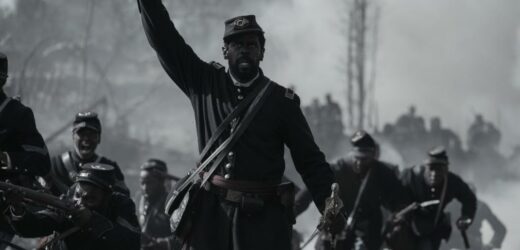Mustafa Shakir has always had a “hang up” about slave movies, so when his agent sent him the script for Antoine Fuqua’s “Emancipation” saying the casting director wanted him to read for Gordon, one of the slaves, it wasn’t a surprise that “the role didn’t resonate.”
But Shakir, best-known for his TV work (“Luke Cage,” “The Night of,” “The Deuce”), was surprised by the casting director’s response, which was to ask what role he’d like to play. “I said, ‘Other than Peter?’” he deadpans, referring to Will Smith’s lead role that dominates the film. “There’s this guy Andre Cailloux.”
Cailloux, who is probably worthy of his own film, was born a slave but earned his freedom in 1846, learned to read, found success as a boxer and became a respected New Orleans businessman and community leader. In “Emancipation,” Cailloux is a military captain, one of the first Blacks to lead a unit. He takes the newly free (and uneducated) Peter under his wing and then delivers a rousing speech to his all-Black regiment before leading them into an impossible fight.
“I was trying to find someone with a certain dignity and strength, who has a presence even when he wasn’t saying anything,” Fuqua says. When he hit play on Shakir’s audition, he noted a voice and presence that reminded him of Denzel Washington. “Then I looked up and this guy is darker than me but has icy blue eyes. That’s striking. And he has a great smile. I remember thinking, ‘This guy’s a star.’”
When Shakir arrived on set, Fuqua noticed that he projected a leadership quality with the cast and crew. So on the first day, he turned to the actor and said, “Get your troops in order.”
Shakir was just taking in the hundreds of men and the cacophony of voices when Fuqua gave that command. “I had to get their attention and make them snap to,” says Shakir, who briefly studied at the Actors Studio but didn’t like it; instead, he often draws on what he learned studying psychology and cultural anthropology at the New School.
“I remember feeling, ‘Oh this is what it must feel like to have to lead’ so big ups to Antoine for making me do that,” Shakir adds. “It made me connect to these people and feel a sense of responsibility for organizing them in a moment. When it came time to give my speech later I was talking to these men like I knew them. The fuse had been lit already.”
In that fiery speech, just before battle, Shakir rouses the men by pointing out that while they are being sent to almost certain slaughter, as Black men fighting to end the Civil War, they had both a powerful motivation and responsibility that the white generals could never understand.
“Mustafa is a lion,” Fuqua says. “He’s low-key but when it’s time to hunt, he just lights up. When I first was editing the speech you could see this guy has some fire in him so I didn’t cut away a lot and just stayed with him.”
Shakir says his performance, both in the speech and in the battle scenes that follow, were fueled by his surroundings. “This was not a soundstage, we were out there in the mud in Louisiana with mortars going off,” he says, adding that he sees how soldiers can be traumatized without even killing anybody because of how the chaos and noise disrupts the nervous system.
“You can do all the research and have notes and think all you want but it goes out the window when you’re on the ground,” he adds. “I was there in the field and feeling the energy of all these men, with bombs going off and all that visceral information inspired the way it came out.”
Read More About:
Source: Read Full Article


